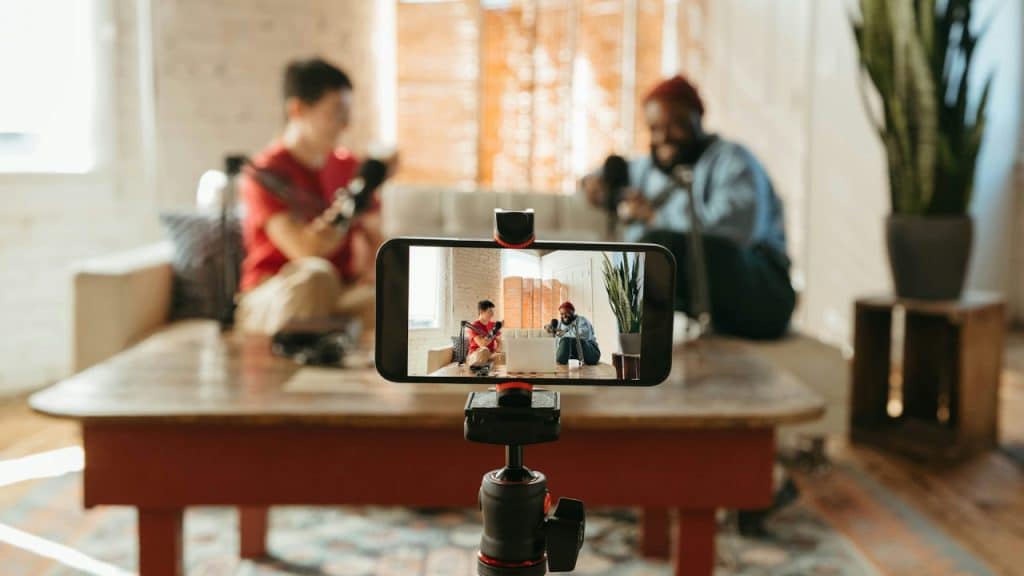How to Become a Content Creator: Career Guide

In addition to staying on top of current trends, mastering aspects of design and digital media, like multimedia and filmmaking, can bring your content to the next level. Whatever form of content you’re interested in creating, be it video, photo, digital marketing material, or even video games, an education in certain foundational skills can propel your career forward as a professional content creator.
What Is a Digital Content Creator? Key Roles and Responsibilities
The term “content creator” can mean many things, but in today’s era of digital connections, we know it as the act of creating intentional content to resonate and connect with a specific audience online. In addition to the flexible work-from-home schedule, many content creators get into the field because it allows them to share their unique, creative perspective, build audiences and subscribers around common passions and causes, and most importantly, monetize content through sponsorships, affiliate marketing, and advertising with some of their favorite brands.
Essentially, anyone who creates visual or audio media can now be considered a content creator. This includes YouTubers, TikTok creators, podcast producers, musicians, real estate agents, writers, photographers, social media managers, and everyone in between. In fact, many entrepreneurs learn additional content creation and multimedia skills to creatively market their own existing businesses.
This job diversity makes content creation a highly desirable field to pursue—the career possibilities are endless, and the skills are often transferable. The sky is truly the limit! For example, some TikTok creators shift to marketing careers after learning how to promote their videos online, to inspiring, educating, or advocating for issues they care about. These multimedia and marketing strategies are especially beneficial in today’s digital-first economy.
While some creators specialize in one specific type of content, such as a certain photography styles, many focus on multiple types of content mediums that are the most trendy and effective within their niche. Most video creators make different types of videos for each platform, while graphic designers also often work with animation, typography, and other visual arts. The fact that you can switch up your content on a continual basis to match digital and social media trends, allowing you to always work on something new and exciting, is another reason many people love their content creation careers.
Why Pursue a Career in Content Creation?
If you love the idea of potentially impacting others through informative or educational content that you personally care about, then content creation could be a very fulfilling career path! While it can be a challenging field, it’s also a very rewarding one as you get the opportunity to be part of a quickly growing industry, creating innovative content and helping people connect through common interests and passions.
While you can learn everything you need to be a successful content creator by earning a degree or professional certificate in multimedia design, photography, videography, or an adjacent educational path, it’s also helpful to be creative and to have a natural eye and understanding for what makes engaging content online. An entrepreneurial spirit is quite useful, too!
Keen attention to detail is one very important skill that every successful content creator has, whether it comes naturally to them or they’ve had to spend hours and hours practicing. Even if you don’t notice them, fine details such as color correction, typography, and your marketing strategy can make or break your content. Today, content creators often wear many hats and juggle multiple skills, especially when working on videos and other complex projects.
Consider a video game YouTuber. While we may only see them with a controller in their hand, they also need to frame the camera, set up audio, and edit the video in an enjoyable way—which can take a lot of time. YouTubers also often work with affiliates, sponsors, and collaborators and need to understand extensive rules to stay monetized on the platform. They also need to understand the audience they’re speaking to in order to stay relevant.
The exact skills you need to learn will depend on your goals as a digital creator. Of course, as technology and culture shift, the skills you rely on may need to change, too. So, you should be prepared to learn and relearn your top skills along your content creation journey.
The most beneficial creative and technical skills for content creators include:
- Cinematic video production
- Photography
- Photo editing
- Video editing
- Color correction
- Animation and visual effects (VFX)
- Audio mixing
- Marketing and advertising
Additionally, you may want to consider working on the following areas to maximize your performance:
- Project management
- Copywriting
- Research
- Branding
- SEO
Content Creator Job Outlook and Salary
With an arsenal of skills and trades under their belt, content creators have established dependable careers in multiple industries. Multimedia skills can easily transfer to many different jobs, which can be helpful when changing careers or taking on new responsibilities.
Multimedia design is a broad field, so employment opportunities depend on the creator’s preferred area of focus. There is the chance to work across a variety of digital mediums, from film and television to dazzling interactive web design.
Consider the following content creator jobs and their respective outlooks:
- Social media marketing: Promoting your videos and managing metrics on social media follow the same process as promoting products and services, especially if you’re familiar with the apps. Promotion and marketing managers earn a median salary of over $156,000.
- Animation: Animators create visual content that excites, explains, and entertains. Also known as multimedia artists, they may work in the entertainment industry, creating special effects for movies, television, and video games. In 2023, the average salary for special effects artists and animators was over $99,000.
- Graphic design: These professionals use various creative design skills to create logos, animations, flyers, emails, and much more. The average median pay for this role is nearly $70,000 per year, and the market is growing.
- Professional photography: Many professional photographers start their own businesses or work with others, capturing weddings, conferences, sports events, high school photos, and more. The average median pay for photographers was over $40,000 in 2023.
- Film and video: While the film industry is famously hard to break into, there’s always a need for video and audio content. Creating a name and portfolio for yourself as a content creator can increase your chances of finding a job in film. The median salary for filmmakers, including camera operators and video editors, is over $65,000.
Case Studies: Success Stories From Content Creators Using Multimedia Design
Many content creators have expanded their multimedia skills to create high-quality content. In doing so, they’ve established high-end portfolios and large followings on platforms like YouTube and Instagram.
For example, Kris Collins, or “KallMeKris,” reached over 50 million TikTok followers by creating humorous videos about children and life. She has since launched a clothing brand, received award nominations, partnered with the rock band Nickelback, and launched a professional acting career.
Another digital content creator, Andrew Rea, or “Babish,” launched his YouTube channel Babish Culinary Universe in 2016. In his videos, he teaches viewers basic cooking recipes or focuses on fictional recipes from movies and TV shows. This gradually turned into a successful career for Babish, who has now published multiple books and reached over 2.7 billion YouTube views.
As evident from the case studies above, choosing a career in multimedia design is a great way to combine your unique passions and interests with exciting digital media tools and content to find your audience and monetize your content.
How To Become a Content Creator: Step-by-Step
Technically, anyone who uploads a photo to Instagram has created content, but there’s a lot more to being a content creator than that. The top digital content creators often have years of experience, extensive networks, and a vast array of skills that they’ve invested time and money into. A formal education, like an Associate Degree in Digital Media, will help you gain and refine the necessary skills and build a strong portfolio of work, giving you an upper hand.
Follow these steps to learn how to become a content creator:
- Identify your medium: Are you leaning more toward video, photo, audio, or written content? Recognizing the medium you’re working with can help you find your best tools, platforms, and skills early on.
- Find your niche: Another important first step in becoming a content creator is choosing your niche. What kind of content do you want to create? Who will be the intended audience of your content? Choosing a specific niche, or area of interest, will help you target your market, identify your goals, and showcase your expertise. This is where passion meets marketability.
- Find your personality/voice: Who will you be online? What type of personality do you want to shine through the content you produce? Developing your personal, unique brand voice is key to carving out your own space in the content creation space.
- Hone your skills: Whether you’re starting, changing, or advancing your career, learning new content creation skills puts you at an advantage. A degree or professional certificate from an online school of digital media can help you acquire the skills you need to make high-quality, attention-grabbing content. Outside of traditional education, there’s a vast collection of podcasts, videos, internships, and online mentors available at low or no-cost options.
- Invest in the right tools: The cameras, lights, microphones, and other tools you use can significantly impact your content’s quality. Make sure you have the essential equipment for your projects, and take your time researching the best products. Take notes of what your favorite creators use—there’s no need to reinvent the wheel!
- Find your platform: Unless you work directly for a company, it’s typically up to you to establish your own brand. Consider the most popular platforms to upload your content, such as YouTube, Instagram, Vimeo, and Pinterest, and take your time developing your profile. A course in branding can help you define and polish your public identity.
For 25 years, Sessions College has offered hands-on learning to tens of thousands of students worldwide. Gain real-world experience, build a strong portfolio of work, and hone your craft from wherever you are. Jumpstart your success and select from a range of 100% online accredited programs at the Bachelor’s, Associate Degree, and Undergraduate Certificate levels.
What Education is Required to Become a Content Creator?
While there are no hard and fast rules around education requirements for content creators, the bar is always being raised as more people become interested in content creation careers. If you already have several years of experience and self-taught skills under your belt, your portfolio, network, and references likely speak for themselves.
However, for those just getting started, obtaining a degree from an accredited university can help you stand out from the crowd when employers are looking for candidates who have specialized skills or technical knowledge. It’s also a great opportunity to experiment with your brand and the platforms you want to use. Broadly speaking, professional certificates and degrees in marketing, multimedia, communications, branding, or adjacent areas show recruiters that you are equipped with strong foundational skills, an understanding of media trends, and basic marketing principles. These types of higher education often teach individuals how to anticipate audience/customer needs and which types of content speak to those needs—valuable skills if you hope to monetize your content!
Ultimately, the educational backgrounds of content creators are as diverse as the content they craft, and speaks to the inclusivity of the career and its openness to varied skills and perspectives.
Practical Tips to Building a Content Creator Portfolio
After you’ve identified your focus and begin developing your skills, the next step is to pursue subjects and projects that hold your interest. As you start creating content, you’ll want to be mindful to save all of your work. Even if it won’t end up in your portfolio, being able to look back and see how far you’ve come is incredibly rewarding.
Whether you’re using the Cloud, an external harddrive, or a website, make sure you have a place to save all of your best work. As with any portfolio, quality trumps quantity. Remember to only showcase your strongest creations that speak to your skills and highlight what makes you unique. You’ll also want to track and share the performance of your content to showcase metrics like engagement, follower growth, saves, and so on.
Curating a Strong Portfolio
When you’re building your first portfolio, you’ll likely use samples to start. While samples aren’t paid work, they’re just pieces of content created for hypothetical projects or yourself, they do help you demonstrate your skills and style.
We suggest thinking of your portfolio as a resume, one that doesn’t just list your accomplishments but visually showcases your art in a clean, aesthetically pleasing way. For most content creators, your social channels are your portfolio. When curating your feeds, remember that prospective employers are most interested in candidates that stand out. Not only are they looking for insight into your creative process—how you plan, research, and edit your content—they’re also looking for how your work achieved a result. If you have testimonials, pepper a few throughout your portfolio in a tasteful way.
Additionally, the contents of your portfolio should also include mediums and platforms relevant to your niche, display your versatility, and most importantly, illustrate your commitment to detail.
Essential Multimedia Tools for Content Creators
The right tools and equipment can improve your content’s final look and simplify your creation processes. For example, high-quality lights and a clear background can make your photos and videos look crisp and shadowless.
Essential photo and video equipment include:
- High-quality cameras
- Removable camera lenses
- Camera straps
- Tripods
- Ring lights
- Wireless microphones
- Studio microphones
Digital tools, such as editing apps, can also save you significant time. Many apps, such as TikTok, already have basic video-editing capabilities built into their platforms, but these can be limiting and unreliable to use. Instead, third-party apps, such as CapCut, give you more editing features and let you share content on multiple platforms.
The best multimedia tools for content creators include:
- Canva
- Grammarly
- CapCut
- InShot
- Adobe Photoshop
- Adobe Lightroom
- Adobe Premiere Pro
Regulatory Updates Impacting Content Creators and Multimedia Designers
Full-time content creators must also consider the business end of their art, especially if they want to turn it into a long-term career. Every platform has unique rules regarding copyright, brand partnerships, and monetization.
For example, while TikTok lets you use most audio in personal videos, you can only use a few options for business purposes—and most videos will get flagged as unoriginal if you post them on another app. Staying atop your copyright and legal expectations can improve your chances of partnerships, collaborations, and sponsorships later on.
Advancing Your Content Creator Career
Once you’ve mastered being a content creator, you may seek out additional career advancement opportunities or paths to explore. Depending on which advanced technical skills you possess, and which ones you’re willing to devote additional time to, there are many different careers available.
Here are just a few additional career paths you could follow after training as a content creator:
- Marketing manager
- Social media manager
- Production assistants
- Graphic designers
- Content specialists
- Content editors
- Content managers
- Copywriting
- Brand managers
Content Creation Career Success
Whether you have 10 or 10,000 followers, you can always learn new skills to improve your content creation game. The filmmaking, multimedia, and digital media paths offered at Sessions College are among the most creative, flexible, and affordable ways to set yourself up for success. Our online courses can help you master graphic design, videography, advertising, and much more. Our classes are project-based and hands-on, allowing you to gain real world experience and build a strong portfolio of work while honing your craft.
Explore our course catalog and get in touch today to learn how to become a content creator and take your career to the next level.
Content Creator: Frequently Asked Questions
Q: What does a content creator do?
A content creator produces and shares engaging media across various platforms to inform, entertain, or influence an audience. This can involve creating videos, photos, blog posts, podcasts, or social media posts. Content creators often work in different formats like video production, photography, graphic design, writing, or podcasting.
Their responsibilities may include researching topics, generating ideas, producing high-quality content, editing, and managing distribution on platforms like YouTube, Instagram, or blogs. They may also collaborate with brands, engage with audiences, and analyze the performance of their content to refine strategies. Content creators can work independently creating content for themselves, as freelancers creating content for other brands, at agencies, or in-house at a company.
Q: Is it hard to become a content creator?
While you don’t necessarily need special training to make content, like blogs or videos for social media, it is a competitive space. If your goal is to pursue a career as a content creator, formal training such as a degree or certification course in digital media, graphic design, or filmmaking can help you gain experience, build a portfolio, and take your skills to the next level.
Q: How do content creators make money?
To make money as a content creator, you can earn through ad revenue on platforms like YouTube or TikTok, brand sponsorships, and affiliate marketing. Additionally, you can offer specialized services such as editing or design as a freelancer for various projects. You can also use your content creation skills in a traditional job role, such as a marketing manager, writer, or video producer within a company.
Q: Why become a content creator?
The content creation skillset can lead to diverse career opportunities, from animator to social media influencer to chief marketing officer, and can become a well-paying, fulfilling career. Knowing how to make creative and engaging content is invaluable in today’s digital-first world. The opportunities are truly endless.
Q: How has AI impacted content creators?
For better or for worse, generative artificial intelligence (genAI) has revolutionized content creation and multimedia design in many different ways. While this potentially limits the opportunities for some creators, many have also taken advantage of the technology’s advancements. AI tools have helped creators improve efficiency by automating video editing, improving graphic design, and revising written content.

Trevor is a writer and storyteller based in Detroit who loves following a good story or conversation. Trevor writes on entertainment, narrative, and social change. Read more articles by Trevor.
ENROLL IN AN ONLINE PROGRAM AT SESSIONS COLLEGE:

























